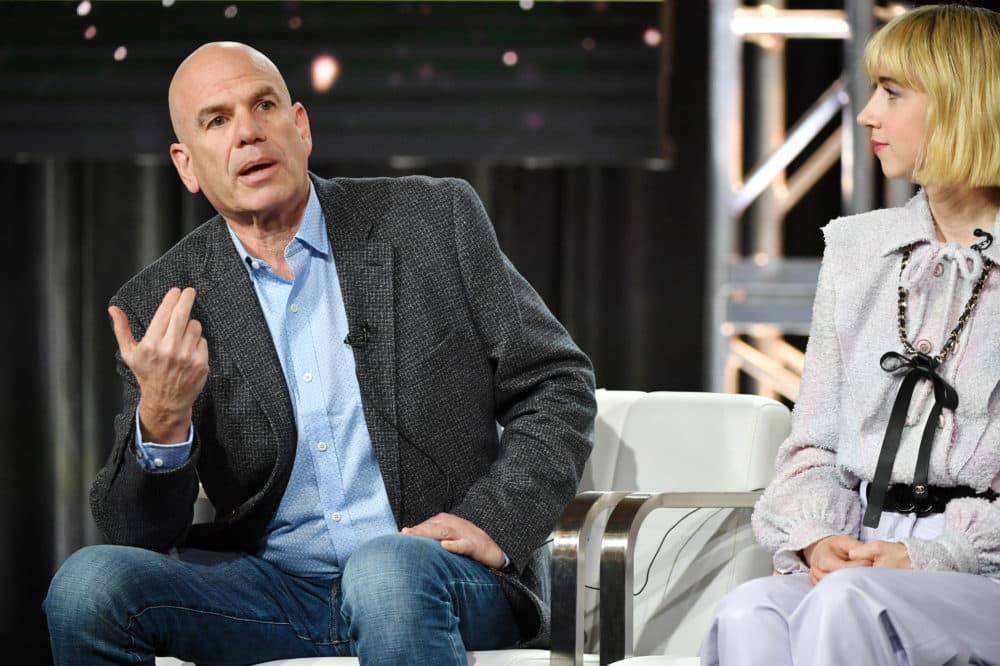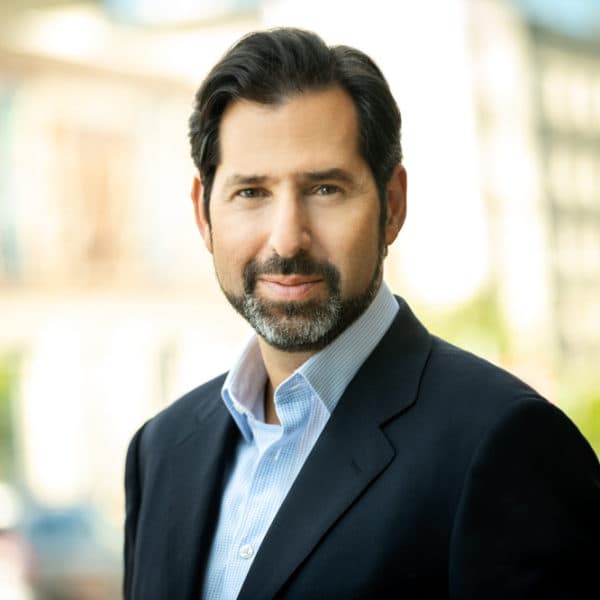Advertisement
'The Plot Against America': HBO Series Imagines A Charles Lindbergh Presidency
Resume
Emmy-award winning writer and producer, David Simon, on his new HBO miniseries, “The Plot Against America," and why making the real-life iconic aviator and anti-Semite, Charles Lindbergh, president in 1940 is instructive for our times today.
Guests
David Simon, Emmy-award winning writer and producer of "The Wire," "The Deuce" and "The Plot Against America." (@AoDespair)
Interview Highlights
On Philip Roth’s 2004 novel, on which the show is based
“It's a parlor drama of a Jewish American family in a Jewish section of Newark, New Jersey. Roth, one of our great novelists, used his own family, his own memories of his own childhood, as a prism to look at a particular moment in American history when we were potentially subject to a very popular demagogue and a moment where our own latent fears — of the other, of outsiders, of immigrants, of those who are a little bit different than us, who maybe worship a little different or have a different nation of origin — where our natural xenophobia could be used and metastasized to create political power and to challenge democratic norms. And he did it brilliantly. It's a fascinating novel. At the time, I thought it was an artifact. I thought, well, we're better than that now. I thought it was a verdict on a moment in 1940. But if you read that book after November 2016, it's startling. I think Roth himself said he didn't intend an allegory to that moment in time, but he certainly saw it once the election occurred.”
On the similarities between Lindbergh and Trump’s political appeal
“Both men had this moment of political prominence and utilized the American fear of the other, that natural worry about the immigrant horde, about those people who are coming who are less American than we are, who cannot be regarded as entirely trustworthy, whose loyalties can be questioned. They use that to seize the public imagination and to maintain or create power. And that was precisely the same [with Trump]. And, you know, [Lindbergh] was very aware that what was said in 1940 about Jewish Americans and how they were made to feel vulnerable for their opposition to Adolf Hitler and their sense of the necessity of America staying involved in what was happening in Europe and how their Americanism, their citizenship was questioned. That is very, very similar to what you now see with black and brown people and Muslims and recent immigrants to this country, and how they are othered as a political means.”
On the moral urgency of the current moment
“The intriguing part of this for me is that it's not 1944 or 1942, to use the historical allegory. It's 1932, 1933 in America, to use the Nazi allegory. This is the moment where somebody seizes upon 'the other' as being everyone's problem. This is what's holding us back. This is what's threatening us. They're not like you and me. And your status as Americans is made vulnerable because of these new arrivals, because of these less-than-American citizens. And Lindbergh uses that to obtain and retain power. And that's what is interesting to me.
“... We always ask ourselves those questions about, you know, looking retroactively at history. What would I do if I was in Germany in 1934, ‘35? What would I do if I was watching Kristallnacht happen in ‘38 and I wasn't Jewish? What would I do if I was an abolitionist? How far would I go in 1850? Well, Roth basically used his family to put them in that moment, and he dragged them all through history that way. And I kind of want to do that right now, allegorically, for every viewer, which is to say, I think there are things happening right now, whether you're conservative or Dem or Democratic or Republican or liberal is almost not the point. There are norms now and institutions in American society that are elemental to the maintenance of a republic. And democracy is the hardest and most troubling form, it's certainly the least functional form of government until you consider all the other ones. And the fact is, it's hard work and it requires you to get up and kill snakes every day. I don't know about you, but I'm less and less assured that we have the capacity as a nation to do it anymore. So I kind of want to rub everybody's nose in this moment of 1940 and say, ‘It's now your moment. What are you going to do?’”
On fighting for freedom every day
“The fight to retain our basic dignity as a society is, to my mind, always quotidien and exhausting and it's never complete. If you've watched [my shows] and you've said, well, what a mess that is or what a mess the Baltimore of The Wire is or what a mess Yonkers is, trying to build 200 units of housing or you know, what a disaster this misadventure in Iraq turned out to be. Whatever the piece you're watching, all the attendant problems of self-governance are baked in, but nowhere is it baked in that you have an excuse to walk away from the fight.
“... And the bottom line is there is no walking away. And the fights that you have are the only fights you're allowed to have, which is, you've got to kill some snakes every day and come back the next day and the next day after that. My father — I've referenced my father so many times now, it must be the effect of doing a show on Jewish Americans in the 1940s. But my father, at every Passover Seder, would use the same phrase. He would always come to the same phrase, which is that he'd say freedom is not something that can be ever completely won, but it can be lost. And that to me that is the burden of citizenship in something as complicated as a republic, as a pluralistic, multicultural republic that requires argument and coalitions and maneuvers and negotiation in order to get from point A even to point B. And that's it, man. It's hard, but nobody is absolved of that. And usually what a demagogue is offering you is the opportunity to walk away from the complicated, from the hard work, from the premise that he is the leader of a disparate nation with differing opinions that have to be reconciled.”
Liam Knox adapted this interview for the web.
From The Reading List
The New York Times: "‘The Plot Against America’ Imagines the Rise of an Intolerant Demagogue" — "Philip Roth’s 2004 novel 'The Plot Against America' imagines a counterfactual history in which Charles Lindbergh, campaigning on a promise of 'America First,' defeats Franklin D. Roosevelt in the 1940 presidential election and, colluding with Hitler, embarks on a program of government-sponsored anti-Semitism and Jewish resettlement.
"A few months before he died, in 2018, Roth told me in an interview that he never intended his book as a political allegory. But by then, with the Trump administration in full swing, he agreed that the parallels between the world he invented and what was happening in contemporary America were hard to ignore: a demagogic president who openly expresses admiration for a foreign dictator; a surge of right-wing nationalism and isolationism; polarization; false narratives; xenophobia and the demonization of others.
"Still, there was one difference, Roth insisted: Lindbergh, unlike President Trump, had been a genuine hero.
"During that same conversation Roth added, almost in passing, that he had recently agreed to let David Simon make a mini-series of the novel and that though he was unfamiliar with most of Simon’s work, he trusted him to get it right."
Vanity Fair: "HBO’s Plot Against America Paints an All-Too-Plausible Alternate History" — "While Winona Ryder was shooting the HBO limited series The Plot Against America, she thought about whether she’d experienced anti-Semitism. Based on Philip Roth’s 2004 novel, the series imagines an alternative history in which Nazi sympathizer Charles Lindbergh defeats Franklin Roosevelt in the 1940 presidential election, resulting in anti-Semitic policies and outbreaks of violence against Jews. Ryder flashed back to the time someone drew swastikas on her brother’s locker, and her youthful nights at the San Francisco punk club Mabuhay Gardens—where she’d keep an eye out for skinheads whose combat boots had white laces, a symbol for white power. But the thing that gave Ryder most pause was remembering a comment she’d heard repeatedly from entertainment industry insiders over the years, including people she respected.
"'People say, ‘You’re Jewish, but you’re so pretty…you don’t look Jewish,’' Ryder said, her face convulsed with an unclassifiable mixture of surprise and disappointment as she sat in a Pasadena hotel room. 'It’s subtle, but when you are Jewish...' Ryder left the sentence hanging in the air, as she often did in our conversation, breathlessly leaping on to her next thought. 'Does it fall under an anti-Semitic category, or just offensive?'
"Born Winona Horowitz, Ryder recalled going to visit her grandparents in Brooklyn for Passover every year. But she grew up in a secular, countercultural household in Northern California. Her father worked as an archivist for acid guru Timothy Leary, who was Ryder’s godfather. Being Jewish wasn’t top of the list of things by which she defined herself. Yet those tiny moments, the ones where her Jewishness became explicit, inevitably came to the fore as she poured herself into this project."
This program aired on March 13, 2020.
